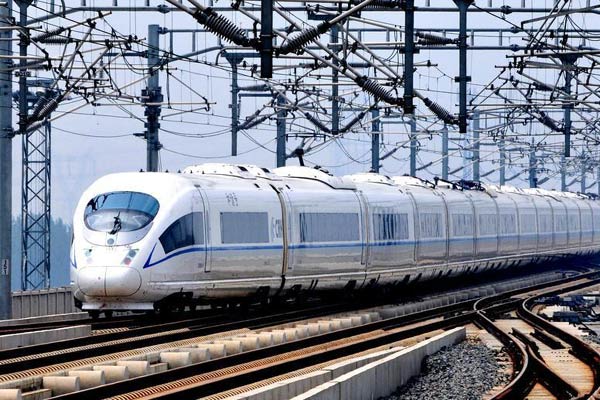Five roadblocks on the way to a well-off society
By Han Baojiang (China Daily) Updated: 2015-11-28 09:11
 |
|
A CRH train that runs on the Beijing-Shanghai High-Speed Railway leaves Tianjin South Railway Station in North China's Tianjin, June 30, 2012. [Photo/Xinhua] |
What is the most important task for China to build a well-off society in an all around way in the next five years? The answer is overcoming the roadblocks. Agriculture, lack of innovation, low consumption rate, an immature service sector and unsatisfactory environmental protection are current weaknesses of the Chinese economy.
Since the shortcomings have accumulated over the years due to complicated reasons, they are not easy to overcome.
The key to building a well-off society is to increase farmers' income, and address the issues of agriculture, farmers and rural areas. Policies such as removal of agricultural taxes that had a history of more than 3,000 years, raising the purchase prices of grains, and increasing various subsidies have already been implemented.
But the problem of rural residents' low income has not yet been solved, as the average net income of people in the countryside is just 34 percent of the average disposable income of urban residents.
The fact, however, is that prices of agricultural products in China are higher than in the international market; and domestic agricultural subsidies have not been loosened for years. Therefore, traditional policies alone can no longer be useful to promote agricultural development and increase farmers' income. This means the goal of poverty alleviation cannot be reached by just adhering to the traditional path of agricultural development.
The second hurdle is lack of innovation capability. Technological development and innovation have contributed little to China's economy. Products made in China have the largest market in the world. Laptops made in China, for example, have more than 60 percent share of global trade. But without excelling in core technology or brands, the industry is kind of working for brands from developed countries.
The value-added rate of China's manufacturing industry is only 26.6 percent of the world total, or more than 20 percent lower than the figure for advanced countries such as the United States and Germany.
Low consumption rate is another drawback. As investments and exports decline, China can maintain a GDP growth rate of more than 6.5 percent by only boosting consumption, which is vital to building a well-off society in the next five years.
The contribution of domestic consumption to China's economy is much lower than the world average. In the third quarter of this year, consumption contributed 58.5 percent to the national economy, lower than the world average is 61 percent.
To boost consumption and stabilize economic growth, China has to not only increase people's incomes, but also improve the quality of its products and the consumption environment. But to boost consumption we need effective supply.
The fourth roadblock is the immature service sector. A well-off society has to not only meet people's basic needs of food, clothing, housing and transportation, but also to improve the quality of people's life, which requires a mature service sector.
In the first half of this year, the tertiary industry accounted for 49 percent of China's economy. This is lower than the 2013 figure of 55.18 percent for middle-income countries and 50.5 percent of low-income countries.
Moreover, severe pollution, especially of air, water, and soil, has made protecting and improving the environment a major task of the 13th Five-Year Plan (2016-20). Some cities and regions still seek development at the cost of the environment. Therefore, the government should expedite reform of environmental protection mechanisms, establish a vertical management system of supervision and law enforcement among environmental agencies in the provinces and regions.
The roadblocks can be cleared by equipping the economy with new ideas, innovative, harmonious, environmentally friendly rules, and dealing with the old problems through new methods.
The author is the director of the Economics Department of the Party School of CPC Central Committee.

I’ve lived in China for quite a considerable time including my graduate school years, travelled and worked in a few cities and still choose my destination taking into consideration the density of smog or PM2.5 particulate matter in the region.











